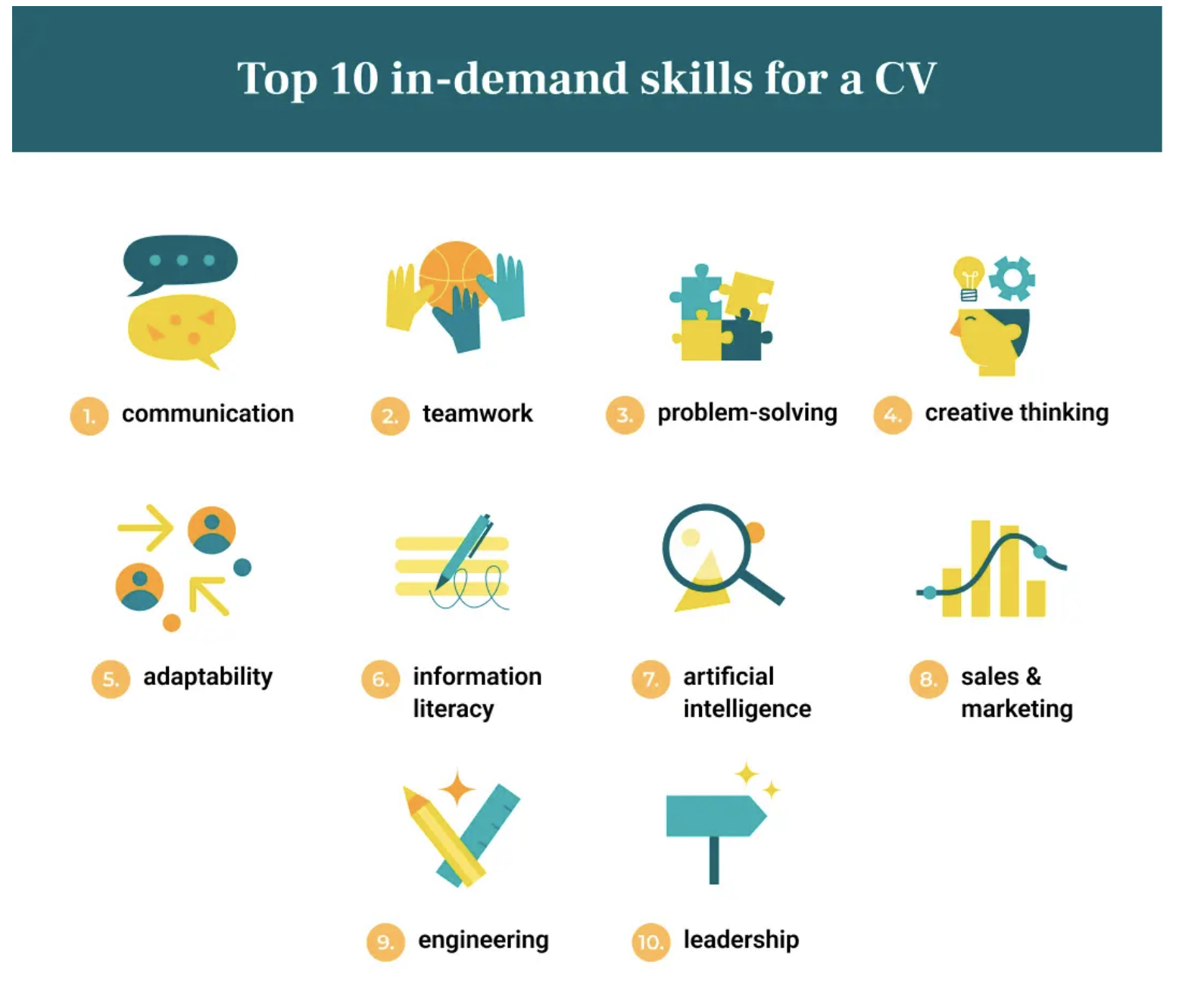[Knowledge & Skills] 10 Skills to Include on a CV in 2025
You can’t write a CV without including skills. They’re proof that you have the necessary qualifications to do the job. But how do you choose the best skills to add to your CV? And which skills can actually be considered “the best”?
10 best skills to put on a CV
The best skills to put on a CV are those in high demand. After analysing dozens of reports from the UK National Foundation for Educational Research, the Manpower Group, and many others, I prepared a conclusive list of the top 10 in-demand skills for a CV.

How to develop your CV skills
Your CV skills don’t all have to come from the workplace. Some of the strongest, most transferable abilities are developed in everyday life, volunteering, or even hobbies. Here's how to grow and recognise the key skills for your CV, no matter where you're starting from.
1. Learn by doing
One of the best ways to build skills to put on a CV is by diving into hands-on experience. Whether you're volunteering, freelancing, or starting a small side project, real-world situations help you sharpen abilities like teamwork, organisation, or problem-solving—some of the most sought-after skills for CVs across industries.

2. Reflect on everyday wins
Not all CV skills come with a certificate. Think about challenges you’ve overcome, systems you’ve streamlined, or people you’ve supported—these experiences reveal valuable strengths. You might be a great communicator from leading a club, or you’ve honed your time management by juggling work and study. These are all good skills for a CV.
3. Stay curious and keep learning
Upskilling doesn’t always mean going back to school. Online courses, workshops, and tutorials are fantastic for building key skills for a CV, like digital tools, leadership approaches, or creative thinking techniques. Continuous learning shows initiative, which is always a great signal to employers.
4. Ask for feedback
Sometimes others can spot your strengths more quickly than you can. Ask colleagues, mentors, or friends what they think you’re great at. This feedback can reveal skills to put on your CV that you hadn’t considered, and give you language to describe them more confidently.

5. Challenge yourself in new contexts
Stepping into unfamiliar roles or situations helps you grow. Whether speaking at an event, joining a committee, or leading a new task, putting yourself in new environments strengthens adaptability, leadership, and initiative—standout skills for any CV.
Bonus skills to put on a CV
There are hundreds, if not thousands, of skills you can include on a CV. In the beginning I gave you the current top 10 CV skills employers want and need. Now, I'll show you some additional skills and skill groups you may want to invest in and focus on your CV.
1. People skills
They are essential for building positive relationships with others in the workplace. These include the ability to communicate effectively, empathise, and engage with colleagues, clients, and customers. Whether you’re managing a team, dealing with customers, or collaborating with colleagues, strong people skills are key to creating a positive work environment and fostering teamwork.
People skills encompass both verbal and non-verbal communication, emotional intelligence, and the ability to manage conflict or differences in opinions. When adding people skills to your CV, consider using examples that demonstrate your leadership or customer service experience.
2. Administrative skills
These skills include organising schedules, handling correspondence, and ensuring smooth day-to-day operations. Being proficient in administrative tasks shows that you are reliable, organised, and able to manage time efficiently. Data entry, filing, and calendar management are just a few examples of administrative responsibilities that are crucial for maintaining operational flow.
When listing administrative skills on your CV, be specific about the tools and systems you’ve worked with, such as Microsoft Office, Google Suite, or any CRM software.
3. Language skills
Whether you're multilingual or proficient in a single second language, the ability to communicate in more than one language opens up more opportunities. Employers value language skills as they enable better communication with international clients, partners, and customers.
On your CV, list the languages you speak and your level of proficiency, such as fluent, conversational, or basic. If you’ve used language skills in a professional context, such as translating documents or conducting meetings, make sure to highlight this experience.

4. Organisational skills
These skills are important in nearly every role, whether you’re managing projects, coordinating teams, or handling day-to-day administrative work. Organisational skills include time management, prioritisation, and delegation.
To showcase these on your CV, provide examples of times when you successfully coordinated events, managed competing priorities, or organised a large-scale project. Tools like project management software or task prioritisation techniques are also important to mention if you’ve used them.
5. Digital skills
They are crucial in the technology-driven field. These skills range from basic computer proficiency (e.g., using office software) to more advanced abilities like data analysis, programming, or social media management. As businesses increasingly rely on digital tools and online platforms, proficiency in digital skills is essential to staying competitive.
On your CV, highlight the digital tools or software you’re skilled in, such as Microsoft Excel, Google Analytics, Salesforce, or Adobe Creative Suite. These specific tools will demonstrate your technical proficiency and adaptability.

6. Conflict resolution
These skills involve negotiation, mediating disputes, and finding common ground between conflicting parties. Strong conflict resolution skills enable you to maintain positive relationships, reduce tension, and ensure smooth communication between teams or clients.
To highlight these skills on your CV, provide examples of times when you helped resolve disputes or facilitated a difficult conversation that led to a positive outcome.
7. Negotiation skills
The ability to negotiate effectively ensures that both parties feel heard and that agreements are reached fairly and efficiently. Whether negotiating contracts, project timelines, or salaries, negotiation is about finding mutually beneficial solutions and navigating difficult conversations with professionalism.
On your CV, provide examples where you successfully negotiated deals, handled client expectations, or resolved disagreements, particularly when quantifiable results were achieved, such as cost savings or improved terms.
8. IT skills
From basic tasks like using word processors and email platforms to more advanced skills like coding, networking, and data analysis, strong IT abilities will help you succeed in nearly any job. Being comfortable using technology can significantly improve your efficiency and productivity.
:max_bytes(150000):strip_icc()/list-of-information-technology-it-skills-2062410-v2-5b7494d9c9e77c00575e7813.png)
When listing IT skills on your CV, specify your proficiency with tools such as Microsoft Office, cloud-based software, or more specialised skills like Python or SQL. Be sure to include any relevant IT certifications as well.
Source: livecareer
Latest Updates
Latest Articles
Discover our most recent articles, updates, and insights from our team
[Latest News] Trump Proposes Fast-Track Nuclear Power Licensing for Tech Firms to Support AI Growth
U.S. President Donald Trump announced a bold new proposal aimed at addressing the skyrocketing energy demands of artificial intelligence (AI).
[Latest News] Vietnam Breaks Ground on Its First Semiconductor Chip Manufacturing Plant
Vietnam has officially begun construction of its first semiconductor chip manufacturing plant, marking a major milestone in the country’s efforts to develop a domestic semiconductor industry.
[Latest News] Key Activities at the ASEAN Digital Ministers’ Meeting
The 6th ASEAN Digital Ministers’ Meeting (ADGMIN), held in Hanoi from January 12–16, 2026, features a series of activities designed to strengthen digital cooperation across Southeast Asia and beyond.